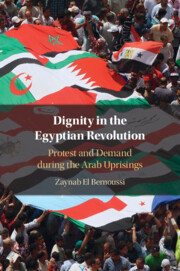Book contents
- Dignity in the Egyptian Revolution
- Dignity in the Egyptian Revolution
- Copyright page
- Dedication
- Contents
- List of Figures
- Foreword
- Acknowledgments
- A Note on Transliteration
- Glossary of Arabic Terms
- Introduction
- 1 Dignity as Faith
- 2 Dignity as Identity
- 3 Dignity as a Human Right
- 4 Dignity as Materialism
- 5 Dignity Recognition, Not Status
- Conclusion
- Select Bibliography
- Index
2 - Dignity as Identity
Published online by Cambridge University Press: 18 June 2021
- Dignity in the Egyptian Revolution
- Dignity in the Egyptian Revolution
- Copyright page
- Dedication
- Contents
- List of Figures
- Foreword
- Acknowledgments
- A Note on Transliteration
- Glossary of Arabic Terms
- Introduction
- 1 Dignity as Faith
- 2 Dignity as Identity
- 3 Dignity as a Human Right
- 4 Dignity as Materialism
- 5 Dignity Recognition, Not Status
- Conclusion
- Select Bibliography
- Index
Summary
This chapter focuses on the theme of dignity as identity and particularly Arab identity. One of the important components in the construction of nationality is consolidating a sense of identity. Karama/dignity – in the sense of being an image of God with inherent worth – has supported for millennia a sense of identity for humans. In the discussion of karama as identity in the slogans of the 2011 Arab Uprisings in Egypt, the chapter shows that there is a widespread understanding of the lack of dignity in Arab contexts, mostly due to oppressive political regimes in a postcolonial setting, which can be seen through various expressions of karama as identity in arts and in the interviews. The chapter also highlights how identity politics are also essential to increasingly globalized societal contexts around the world.
Keywords
- Type
- Chapter
- Information
- Dignity in the Egyptian RevolutionProtest and Demand during the Arab Uprisings, pp. 43 - 70Publisher: Cambridge University PressPrint publication year: 2021

